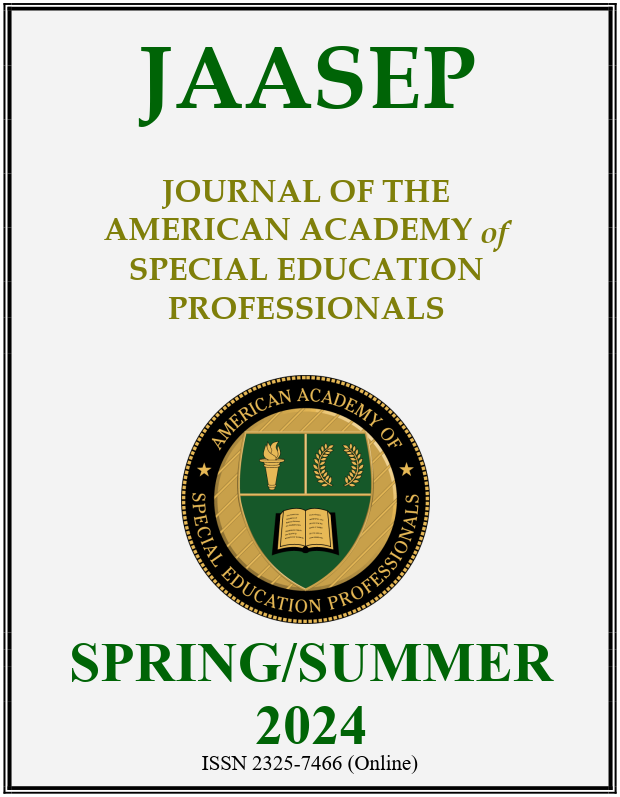Teacher Evaluation and the Professional Development Connection: Perspectives of Special Education Teachers
Ary, D., Jacobs, L.C., Sorensen, C., Razavieh, A. (2010). Introduction to Research in Education (8th ed.). Belmont, CA: Cengage Learning.
Benedict, A. E., Thomas, R. A., Kimerling, J., & Leko, C. (2013). Trends in teacher evaluation. TeachingExceptional Children, 45(5), 60–68. https://doi.org/10.1177/004005991304500507 DOI: https://doi.org/10.1177/004005991304500507
Brobbey, G., & Kmail, Z. (2022). Improving teacher evaluation outcomes for special educators: what do the ‘gatekeepers’ say? Journal of Research in Special Educational Needs, 22(1), 54–65. https://doi.org/10.1111/1471-3802.12532 DOI: https://doi.org/10.1111/1471-3802.12532
Brownell, M. T., & Jones, N. D. (2015). Teacher evaluation in special education: approaches, supporting research, and challenges confronted. Journal of Special Education Leadership, 28(2), 63–73. Carbaugh, C., Marzano, R., & Toth, M. (n.d.). The Marzano focused teacher evaluation model: A focused, scientific-behavioral evaluation model for standards-based classrooms. Learning Sciences Marzano Center. www.learningsciences.com
Cherasaro, T. L., Brodersen, R. M., Reale, M. L., & Yanoski, D. C. (2016). Teachers’ responses to feedback from evaluators: what feedback characteristics matter? (REL 2017–190). U.S.
Department of Education, Institute of Education Sciences, National Center for Education Evaluation and Regional Assistance, Regional Educational Laboratory Central. http://ies.ed.gov/ncee/edlabs
Creswell, J. W. (2015). Educational research: Planning, conducting, and evaluating quantitative and qualitative research (5th ed.). Boston, MA: Pearson.
Darling-Hammond, L. (2013). Getting Teacher Evaluation Right: What Really Matters for Effectiveness and Improvement. New York, NY: Teachers College Press.
Delvaux, E., Vanhoof, J., Tuytens, M., Vekeman, E., Devos, G., & Van Petegem, P. (2013). How may teacher evaluation have an impact on professional development? A multilevel analysis. Teaching and Teacher Education, 36, 1–11. https://doi.org/10.1016/j.tate.2013.06.011 DOI: https://doi.org/10.1016/j.tate.2013.06.011
Derrington, M. L., & Kirk, J. (2016). Linking job-embedded professional development and mandated teacher evaluation: teacher as learner. Professional Development in Education, 43, 1–15. https://doi.org/10.1080/19415257.2016.1231707 DOI: https://doi.org/10.1080/19415257.2016.1231707
Doyle, W., & Ponder, G. A. (1977). The practicality ethic in teacher decision-making. Interchange, 8(3), 1–12. https://doi.org/10.1007/BF01189290 DOI: https://doi.org/10.1007/BF01189290
Frey, T. J. (2009). An analysis of online professional development and outcomes for students with disabilities. Teacher Education and Special Education, 32(1), 83–96. https://doi.org/10.1177/0888406408330867 DOI: https://doi.org/10.1177/0888406408330867
Fullan, M. (2001). The New Meaning of Educational Change (3rd ed.). Teachers College Press. Glowacki, H., & Hackmann, D. G. (2016). The effectiveness of special education teacher evaluation processes: perspectives from elementary principals. Planning & Changing, 47(3/4), 191–209.
Hill, H., & Grossman, P. (2013). Learning from teacher observations: challenges and opportunities posed by new teacher evaluation systems. Harvard Educational Review, 83(2), 371–384. https://doi.org/10.17763/haer.83.2.d11511403715u376 DOI: https://doi.org/10.17763/haer.83.2.d11511403715u376
Holdheide, L. (2015). Same debate, new opportunity: designing teacher evaluation systems that promote and support educators in practices that advance all students’ learning. Journal of Special Education Leadership, 28(2), 74–81.
Holdheide, L. R., Goe, L., Croft, A., & Reschly, A. J. (2010). Challenges in Evaluating Special Education Teachers and English Language Learner Specialists (pp. 1–40). National Comprehensive Center for Teacher Quality. https://files.eric.ed.gov/fulltext/ED520726.pdf
Jiang, J. Y., Sporte, S. E., & Luppescu, S. (2015). Teacher perspectives on evaluation reform: Chicago’s REACH students. Educational Researcher, 44(2), 105–116. DOI: https://doi.org/10.3102/0013189X15575517
Johnson, E. & Semmelroth, C. L. (2014). Special education teacher evaluation: why it matters, what makes it challenging, and how to address these challenges. Assessment for Effective Intervention, 39(2), 71–82. https://doi.org/10.1177/1534508413513315 DOI: https://doi.org/10.1177/1534508413513315
Johnson, E. S., Zheng, Y., Crawford, A. R., & Moylan, L. A. (2021). The relationship of special education teacher performance on observation instruments with student outcomes. Journal of Learning Disabilities, 54(1), 54–65. https://doi.org/10.1177/0022219420908906 DOI: https://doi.org/10.1177/0022219420908906
Jones, N. D. (2016). Special education teacher evaluation: an examination of critical issues and recommendations for practice. In J. A. Grissom & P. Youngs (Eds.), Improving teacher evaluation systems: making the most of multiple measures. New York, NY: Teachers College Press.
Jones, N. D., & Brownell, M. T. (2014). Examining the use of classroom observations in the evaluation of special education teachers. Assessment for Effective Intervention, 39(2), 112–124. https://doi.org/10.1177/1534508413514103 DOI: https://doi.org/10.1177/1534508413514103
Kettler, R. J., & Reddy, L. A. (2019). Using observational assessment to inform professional development decisions: Alternative scoring for the Danielson Framework for Teaching. Assessment for Effective Intervention, 44(2), 69-80. DOI: https://doi.org/10.1177/1534508417745628
Lawson, J. E., & Knollman, G. A. (2017). Evaluating special education teachers: school administrators’ perceptions of the process. Journal of Special Education Leadership, 30(1), 6–18.
McLeskey, J. (2011). Supporting improved practice for special education teachers. Journal of Special Education Leadership, 24(1), 26–35.
Morris-Mathews, H., Stark, K. R., Jones, N. D., Brownell, M. T., & Bell, C. A. (2021). Danielson’s framework for teaching: convergence and divergence with conceptions of effectiveness in special education. Journal of Learning Disabilities, 54(1), 66–78. https://doi.org/10.1177/0022219420941804 DOI: https://doi.org/10.1177/0022219420941804
National Council for Accreditation of Teacher Education (2010). Transforming Teacher Education through Clinical Practice: A National Strategy to Prepare Effective Teachers. Report of the Blue Ribbon Panel on Clinical Preparation and Partnerships for Improved Student Learning. Available online at https://eric.ed.gov/?id=ED512807
SAS Institute Inc. (2017). SAS/STAT® 14.3 User’s Guide. SAS Institute Inc. SAS OnDemand for Academics Statistical Software. (2021). SAS Institute Inc. https://www.sas.com/enus/software/on-demand-for-academics.html
Sledge, A., & Pazey, B. L. (2013). Measuring teacher effectiveness through meaningful evaluation: can reform models apply to general education and special education teachers? Teacher Education and Special Education, 36(3), 165–257. https://doi.org/10.1177/0888406413489839 DOI: https://doi.org/10.1177/0888406413489839
Smylie, M. A. (2014). Teacher evaluation and the problem of professional development. Mid-Western Educational Researcher, 26(2).
Smylie, M. A., Miretzky, D., & National Society for the Study of Education (Eds.). (2004). Developing the Teacher Workforce. NSSE: Distributed by the University of Chicago Press. https://www.worldcat.org/title/55855163
The Council for Exceptional Children’s Position on Special Education Teacher Evaluations. (2012). Council for Exceptional Children. https://exceptionalchildren.org/sites/default/files/2020-08/just%20TE%20position.pdf
Woolf, S. B. (2015). Special education professional standards: how important are they in the context of teacher performance evaluation?. Teacher Education and Special Education, 38(4), 276–90. https://doi.org/10.1177/0888406414557284 DOI: https://doi.org/10.1177/0888406414557284
Downloads
Article Information
- Article Type Articles
- Submitted May 25, 2024
- Published June 15, 2024
- Issue Spring/Summer 2024
- Section Articles
